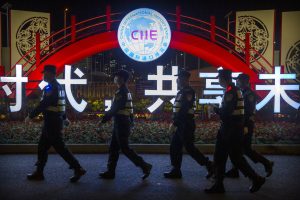By Shannon Tiezzi

On November 4, as the United States’ presidential election drama stretched into a second day, China’s president was speaking, via video, at the opening of an import expo. In a keynote address at the third annual China International Import Expo, President Xi Jinping tried to reassure the world that his government’s new focus on self-reliance and boosting domestic consumption will not disadvantage foreign firms.
The CIIE was a showcase for the Chinese economy, one of the first to recover from the COVID-19 pandemic. Certainly the mere fact that China held an international event, with reportedly over 500,000 registered participants, right now is a testament to the government’s confidence in its pandemic management. More broadly, however, China is among the only major economies projected to grow in 2020, with the IMF and World Bank both predicting growth of around 2 percent. Speaking to the CIIE, Xi sought to make the most of the opportunity to convince foreign companies that China is their best bet for growth as well.
However, Xi’s task is made a bit harder by his government’s new focus on “dual circulation,” which prioritizes the “domestic cycle” of internal consumption and production over the “foreign cycle” of international trade. The two are supposed to complement each other, but it is no secret that China is aiming to prioritize the former. That much was made clear in the communique issued after an important Party plenum in late October. The same communique also reiterated China’s focus on becoming “self-reliant” in science and technology, another worrying point for foreign firms in those sectors.
Less than a week after the communique was issued, however, Xi pivoted to trying to reassure foreign companies (and governments) about China’s commitment to continued “reform and opening” – which also figured in the communique, although less prominently. The CIIE, Xi proclaimed in his speech, “demonstrates China’s sincere desire to share its market opportunities with the world and contribute to global economic recovery.”
Xi tried to frame the dual circulation policy as a positive for the international community. “What we envision is not a development loop behind closed doors, but more open domestic and international circulations,” he said. “…Our aim is to turn the China market into a market for the world, a market shared by all, and a market accessible to all.”
Along with that came promises to continue to increase imports and ease restrictions on trade. In particular, Xi promised that China would further cut the “negative list” (enumerating sectors where foreign investment is banned) for the services trade, especially “in areas like the digital economy and the internet.”
Xi also spoke repeatedly about the importance of “mutual opening up.” That would seem to echo calls for reciprocity, which have come to dominate complaints about unequal market access from trade officials in the United States and European countries. However, Xi’s use of the term also implies that foreign markets are the ones unfairly closed off to China (think, for example, of U.S. tariffs on Chinese goods and the growing number of countries to have banned Chinese telecom firms from 5G competitions).
Xi also pledged to “speed up negotiations” on a China-EU investment treaty and a China-Japan-South Korea trilateral free trade agreement (FTA). Both initiatives have been in the works for years – China and the EU began negotiations in 2014; the China-Japan-South Korea FTA started talks in 2012. There are no real signs of an impending breakthrough after all that time. European governments remain dissatisfied with China’s openness to foreign companies – at a virtual summit with Xi in September, European Commission President Ursula von der Leyen declared that “China has to convince us that it’s worth having an investment agreement.” Meanwhile, with Japan and South Korea still at loggerheads between themselves, talk of a trilateral deal that also involves China remains wildly optimistic.
Meanwhile, even as Xi promised to boost imports and continue to open to the world, China was erecting new barriers against commodity imports from Australia, a move widely perceived as retaliation for worsening China-Australia ties. China’s market is, as Xi said, an opportunity for foreign companies. But it’s also a potent potential weapon, as the Chinese government has repeatedly demonstrated by cutting off access to its market at will.
Those concerns won’t dampen the enthusiasm of the 2,600 exhibitors who set up at the CIIE in Shanghai, hoping to profit off of China’s growing market. But it will take more than a speech from Xi to soothe foreign government’s fears.
No comments:
Post a Comment